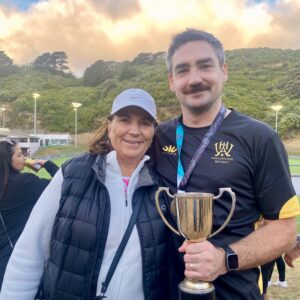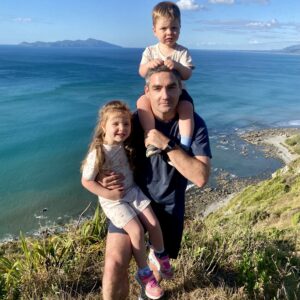
May 30, 2025 | Life with MS, My Story, News
I’m Angus, 35 years old, New Zealand European. I’m married to an incredible woman, and we have two beautiful kids. I grew up in Whangārei and moved to Wellington when I was eight. I’ve got one sister, and no history of illness in the family, in fact most of my relatives live well into their 90s.

I’ve always been active and outdoorsy: rugby, hockey, diving, hunting – a pretty typical Kiwi upbringing! I joined the New Zealand Police at 24 and worked in various locations, including some unique ones like the Chatham Islands and Coromandel. I was never someone who got sick much, I’d had no major illnesses or injuries. I did struggle with long days in the sun, but I figured that was just part of the job.
In 2020, I moved to Coromandel Town for work and to get a bit of financial breathing space – police housing is cheap, and we were ready to start our family. That October, we welcomed our daughter into the world.
But just before that, in September 2020, I started to notice something strange. The left side of my body began to lose sensation. It started mildly but gradually got worse over the next few months. I assumed it was a pinched nerve from wearing my police vest every day. There was no pain, but I couldn’t feel hot or cold on that side; the numbness reached up to my left arm and nipple, like someone had drawn a line down the middle of my body. Oddly, it felt cold on that side, even though it wasn’t to the touch.
I realised something wasn’t right after a couple of incidents with my mates. One day, I went swimming and everyone was complaining about how cold the water was, but I couldn’t feel it. Another time, a friend had an electric dog collar. I strapped it to my left leg and had to turn it up to level 70 before I felt anything. On the right side, level 10 hurt.
At that stage, I hadn’t lost any strength or movement, but the left side of my body was numb. I’d feel cold on that side at night, even though it was warm to touch. I finally went to my GP in December 2020. He was a rural doctor, and after checking me over, he lent me his own car and told me to drive straight to Waikato Hospital.
I spent the next seven days there, undergoing every test imaginable: bloodwork, MRIs, and my personal favourite: the lumbar puncture. I was given daily IV infusions of 200ml of prednisone for a week. In the end, I was discharged with no clear answer – they thought it might have been a viral infection. The symptoms disappeared, and I got on with life.
That whole period was incredibly stressful. I genuinely believe stress played a big role in triggering my symptoms.
For most of 2021, things were stable until summer rolled around again. As the pace of life picked up, so did the numbness. This time it came on quickly, with an annoying tingling sensation, like having pins and needles that never quite went away. I ended up back in Waikato Hospital for more testing and another lumbar puncture. Once again, I was put on prednisone.
At the end of that week, the doctor came into my hospital room and told me, “You have MS. You’re good to go home.” Just like that. No follow-up plan, no clear next steps.
I left the hospital with a splitting headache from the lumbar puncture, and 2.5 hours of driving to get home and process what I’d just been told. At home, I was met by a heavily pregnant wife, our young daughter, and a mind full of worst-case scenarios courtesy of Google. It was a brutal time, stress at work was mounting, we had a toddler, another baby on the way, and I had no idea what MS would mean for my future.
There was no clear guidance on treatment or whether I’d get better or worse. At the time, I was stationed in one of the most remote police outposts from Hamilton, working alone, and I knew that wasn’t sustainable. I started applying for jobs back in Wellington. Over the next few months, I landed a new position, and we welcomed the birth of our son.
It was an amazing time but terrifying too. My body was still acting unpredictably. The tingling in my left side became more intense, almost like a buzzing pain, and now I was losing sensation in my right arm too. Sleep was tough, even without factoring in two kids under two.
In June 2022, we finally moved back to Wellington. That marked the end of our 2.5 years in Coromandel. Despite everything, we’d come through it with two kids, a strong marriage, and a half-working body with an MS diagnosis.

Back in Wellington, I was seen by the neurology team within a few weeks. They were brilliant. They guided me through treatment options and started me on Ocrevus — an infusion I now receive every six months.
Since then, things have improved massively. The sensation in my right side is fully back, and most of my left side has recovered, too. These days, I only really notice the tingling after intense exercise or, strangely, if I try vaping (which I now avoid), it makes the left side buzz painfully. Would not recommend: 1/10.
My life has largely returned to normal. I’ve stayed active, playing hockey almost every weekend, and I’ve recently made the NZ Masters 35s men’s team. I’ve cut back on alcohol – just the occasional drink at events – and I don’t smoke.

Every six months, I go in for my Ocrevus infusion. It’s a full day in a chair, hooked up to medication that’s changed my life. The couple of days after the infusion are rough; my brain feels foggy and my body moves in slow motion. I’ve tried a bunch of sleep aids, both herbal and prescribed, to ease the aftermath, but nothing really works. Still, the treatment does work, and that’s what matters. It’s a small price to pay.
I’ve made some major lifestyle changes since my diagnosis. Most of all, I try to look after my physical health while I still have it. I also make a conscious effort to manage my stress – something I now see as a key trigger. I’ve changed roles at work to reduce pressure, and I take time every week to mentally unpack and debrief from tough situations, rather than letting them build up.
There’s not much I’d do differently. MS isn’t something you can prevent or undo. If anything, I wish I’d asked more questions when I was diagnosed. It’s tough early on – you don’t know how far it’s going to go, or what you might lose.
You’ll hear all sorts of stories: “My friend has MS and she’s fine,” or “My uncle had it and now he’s in a wheelchair.” But everyone’s journey with MS is different. Don’t compare yourself to anyone else. Your experience is your own.
If I had one piece of advice, it would be this: push for the MRI and push for a diagnosis. The sooner you know, the sooner you can start treatment – and that might be what saves you from long-term damage.
One of the lasting challenges for me is still the sun. I have to be really careful about heat. If I’m heading out fishing or to the park with my family, I prepare with a big hat, plenty of water, and I know I’ll be pretty wiped out afterwards. My wife is incredibly supportive, she knows that when we get home, I might not be much use for a while.
Looking ahead, I just want to stay healthy for as long as I can. That’s really what it comes down to.
